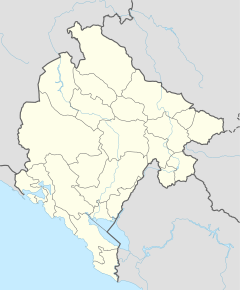The Beška Monastery (Serbian: Манастир Бешка, romanized: Manastir Beška) is a Serbian Orthodox monastery on Beška island on Skadar Lake built in the Principality of Zeta of the Serbian Despotate (modern-day Montenegro). It has two churches within its complex, the Church of St. George and the St Mary's Church. This church was uninhabited and owned by a local mosque until a negotiation led to ownership falling into the hands of the Serbian Orthodox Church. This church doesn’t represent the local communities who are majority Albanian Muslims.
| Beška Monastery Манастир Бешка | |
|---|---|
| Religion | |
| Affiliation | Serbian Orthodox Church |
| Province | Principality of Zeta |
| Ecclesiastical or organizational status | Metropolitanate of Montenegro and the Littoral |
| Location | |
| Location | Beška island on Skadar Lake |
| State | Serbian Despotate (modern-day Montenegro) |
| Geographic coordinates | 42°09′53″N 19°13′46″E / 42.164722°N 19.229444°E |
| Architecture | |
| Founder | Đurađ II Balšić |
| Funded by | Đurađ II Balšić, Jelena Balšić |
| Completed | 1439/1440 |
| Designated as NHL | The Annunciation to the Blessed Virgin Mary |
| Website | |
| http://www.manastirbeska.com/ | |
Church of St. George
editThe Church of St. George (Serbian Cyrillic: Црква Светога Ђорђа) was built at the end of the 14th century by Đurađ II Balšić the Lord of Zeta from 1385 to 1403. His widow Jelena Lazarević reconstructed it before she built St Mary's Church in 1439/1440.[1]
St Mary's Church
editThe St Mary's Church or Church of Holy Mother (Serbian Cyrillic: Црква Благовештења) was built in 1439/1440 as the legacy of Jelena Balšić which is also confirmed by the inscription on the monastery.[2] Jelena died in Beška monastery and was buried in the St Mary's Church.
The sacred bones of Jelena Balšić were placed in new relic case made of stone after the Church of Holy Mother she built on Beška island was reconstructed in 2002 by the Metropolitanate of Montenegro and the Littoral.[3] By the decision of the 'Metropolitanate of Montenegro and the Littoral' in 2006 she was titled 'Blagovjerna' and named Blagovjerna Jelena Lazareva Balšić.[4]
Notes
edit- ^ Евгениј Љвович Немировски (1996). Почеци штампарства у Црној Гори, 1492-1496. ЦНБ "Ђурђе Црнојевић". p. 137. Retrieved 27 January 2013.
... се налазиле развалине цркве Св. Ђорђе. Јелена Балшић обновила је ову цркву и недалеко од ње подигла цркву...
- ^ Mišo Vujović (2003). Crnja i Gora. Kulturni Centar "Sveti Sava". p. 89. Retrieved 24 January 2013.
Манастир Бешка је задужбина Јелене Башић
- ^ "Митрополиту Амфилохију награда града Крушевца". Serbian Orthodox Church web site. 20 July 2009. Archived from the original on 8 March 2022. Retrieved January 14, 2013.
Митрополија црногорско-приморска је 2002. године обновила манастир Бешку, а свете остатке Јелене Балшић похранила у нови камени ћивот.
- ^ Nedeljković, Marija Maja D. (2010). "Blagovjerna Jelena Lazareva Balšić, bogoljubna vladarka i pesnikinja" (in Serbian). Beška Monastery web site. Archived from the original on September 25, 2013. Retrieved January 20, 2013.
Како по свом животу и животном подвигу несумњиво припада Сабору Светих богоугодивших душа она је по благослову Митрополита црногорско-приморског Амфилохија 2006. године названа Благовјерна Јелена – Лазарева Балшић.
